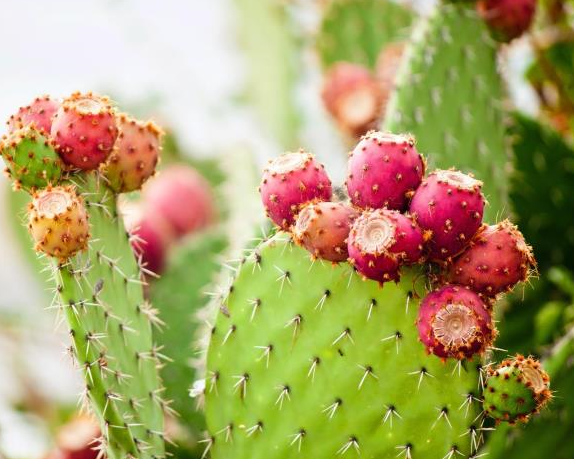
Benefits of Prickly Pear:
1. Rich in Nutrients:
Prickly pear is packed with essential nutrients, including vitamins (especially vitamin C), minerals, and antioxidants.

2. Heart Health:
The fiber, potassium, and antioxidants in prickly pear may contribute to heart health by lowering cholesterol levels and regulating blood pressure.

3. Blood Sugar Control:
Some studies suggest that prickly pear may help regulate blood sugar levels, making it potentially beneficial for individuals with diabetes.

4. Digestive Health:
The fiber content of prickly pear supports digestive health by promoting regular bowel movements and preventing constipation.

5. Anti-Inflammatory Properties:
Prickly pear contains compounds with anti-inflammatory effects, potentially reducing inflammation in the body.

6. Immune System Support:
The high vitamin C content in prickly pear supports the immune system, helping the body fight off infections.

7. Weight Management:
The fiber in prickly pear contributes to a feeling of fullness, potentially aiding in weight management.

8. Hydration:
Prickly pear has a high water content, contributing to overall hydration and supporting various bodily functions.

9. Antioxidant Action:
Antioxidants in prickly pear help combat oxidative stress, protecting cells from damage caused by free radicals.

10. Skin Health:
The antioxidants and vitamin C in prickly pear may promote skin health by reducing signs of aging and protecting against UV damage.

11. Cancer Prevention:
Some studies suggest that the antioxidants in prickly pear may have anticancer properties, though more research is needed.

12. Liver Health:
Preliminary research indicates that prickly pear may have a protective effect on the liver, potentially beneficial for liver health.

Side Effects and Considerations:
1. Allergic Reactions:
While rare, some individuals may be allergic to prickly pear. If any signs of allergy occur, such as rash or difficulty breathing, seek medical attention.

2. Gastrointestinal Issues:
Eating large amounts of prickly pear may cause digestive issues such as diarrhea. It's advisable to start with small amounts and observe individual tolerance.

3. Blood Sugar Monitoring:
Individuals with diabetes should monitor their blood sugar levels when consuming prickly pear, as it may affect glucose levels.

4. Interaction with Medications:
Prickly pear may interact with certain medications, including those for diabetes and anticoagulants. Consultation with a healthcare professional is essential.

5. Thorns and Glochids:
Prickly pear has thorns and glochids (tiny, hair-like spines) that can cause skin irritation. Care should be taken when handling and peeling the fruit.

6. Pregnancy and Breastfeeding:
Pregnant and breastfeeding women should consult with a healthcare professional before incorporating prickly pear into their diet due to limited research on its safety.

7. Kidney Stones:
Prickly pear contains oxalates, which may contribute to the formation of kidney stones in susceptible individuals.

8. Use of Supplements:
If using prickly pear supplements, it's important to follow recommended dosages as excessive intake may lead to adverse effects.

In Summary:
Prickly pear, with its unique flavor and impressive nutritional profile, offers various health benefits. However, individuals should be mindful of potential allergic reactions, digestive issues, and interactions with medications. As with any dietary supplement, it's advisable to consult with a healthcare professional, especially for those with pre-existing health conditions or concerns. Integrating prickly pear into a balanced diet can be a flavorful way to enhance nutrition and potentially reap its health benefits.
'Benefits of Superfoods' 카테고리의 다른 글
| Benefits and side effects of superfood deodeok (0) | 2023.11.30 |
|---|---|
| Benefits and side effects of superfood arrowroot (0) | 2023.11.30 |
| Benefits and side effects of superfood red ginseng (0) | 2023.11.30 |
| Superfood Peppermint Benefits and Side Effects (0) | 2023.11.30 |
| Benefits of Superfood Radish (0) | 2023.11.30 |



